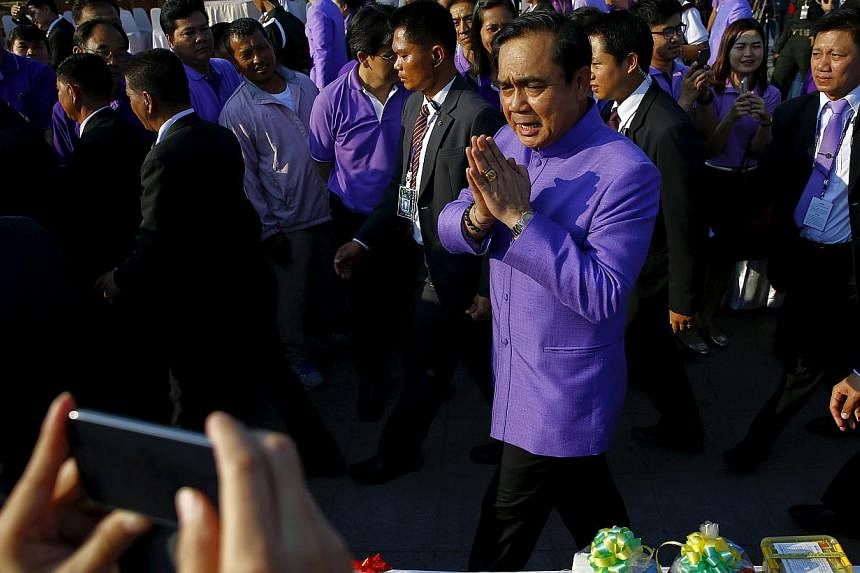One year after Thailand's 12th military coup in its 83 years under constitutional rule, and as the controversial trial for criminal negligence of former prime minister Yingluck Shinawatra gets under way, the country's future is perilously uncertain. In the months ahead, the military-enforced calm will coexist with growing anxiety over what will follow King Bhumibol Adulyadej's nearly seven-decade reign.
Will compromise and mutual accommodation, extremely rare in recent years, enable Thailand to reshape its contested political order - currently underpinned by an elite-driven, monarchy-centred hierarchy - to reflect better the principles of electoral democracy?
Three key factors have defined Thai politics over the past year. First, unlike tried-and-tested post-coup arrangements from the past, the junta that seized power last May, the National Council for Peace and Order, chose to rule directly, with the coup's leader, General Prayut Chan-o-cha, assuming the premiership rather than appointing a recognised and capable figure to the position.
Four-star generals also fill top ministerial positions, from commerce and transport to labour and education. Even the foreign minister is a general rather than a career diplomat. The government's few technocrats, including the deputy prime minister and the finance minister, are holdovers from the previous coup government of 2006-2007, and they complain that they lack authority.
This approach has produced an incoherent economic strategy and vague, sluggishly implemented policy targets. But it is unlikely to change. The new military leaders view themselves as a kind of clean-up crew, tasked with eradicating corruption, keeping politicians in line, and restoring the old order, underpinned by a symbiotic relationship between the military and the monarchy, with the bureaucracy handling day-to-day governance.
To be sure, Thailand's military rulers do not reject responsiveness to public demands or deny the imperatives of adapting to globalisation. Rather, they hope to establish a form of electoral rule that can function within a political order based on traditional Thai institutions and customs. Their aim is to take the country a few steps back and sideways, with the goal of moving forward in a completely different direction.
For now, this means promoting conventional conservative values like discipline, deference, duty and sacrifice. Civil servants have been prodded to wear customary khaki uniforms, and women encouraged to don traditional dresses. Even the fabled floating markets in Bangkok's canals are back, on Gen Prayut's orders.
At the same time, the junta's agenda entails measures to control the direction of Thai politics - in particular, by marginalising opponents, especially politicians tied to the influential Shinawatra family. Indeed, the second major factor shaping the post-coup interregnum was the impeachment of Yingluck, the sister of former prime minister Thaksin Shinawatra who was deposed by the military in 2006 and remains abroad in self-imposed exile. Yingluck has been banned from politics for five years.
The dilemma for the junta is that Thaksin's supporters - who are plentiful enough to have enabled his parties to win every election since 2001 - have been marginalised as well, with little say in the face of martial law and Gen Prayut's absolute rule. Though they have remained quiet since the coup, they will undoubtedly manoeuvre to re-enter the fray as new political opportunities emerge. In any case, they will have to be reckoned with down the road, when a new political order is brokered.
Of course, the junta hopes to lay the groundwork for the future political order now, on its own terms, by adopting a new Constitution. This effort - which has so far entailed the creation of the 36-member Constitution Drafting Committee and the 250-member National Reform Council to help write the new Constitution - marks the third key factor influencing domestic politics over the past year.
The draft Constitution, completed last month, has raised serious concerns, as it places excessive checks on political parties and politicians, while giving appointed bureaucrats and judges the power to overrule policy decisions by elected officials. Elections conducted according to such a Constitution are unlikely to produce legitimate results. The good news is that the junta has agreed to put the draft to a popular referendum early next year, although that probably means that the promised elections will not be held until August, at the earliest.
Military rule has cleared the streets, locked down the political system and ushered in a long transition to some new, as-yet-undefined arrangement. While the anti-coup forces support a return to electoral democracy, the pro-coup coalition, led by the Democrat Party, is increasingly realigning itself against the military, in the hope of securing power in whatever post-coup system emerges.
For now, Thailand is trapped between authoritarianism and democracy, between the past and the future - and will likely remain there until the long royal twilight has passed. At that point, the Thai people, buffeted by domestic polarisation and regional challenges, will have to muster their once-famous negotiation skills to achieve a workable compromise based on their shared interests.
PROJECT SYNDICATE
The writer is professor and director of the Institute of Security and International Studies at Chulalongkorn University's Faculty of Political Science.


